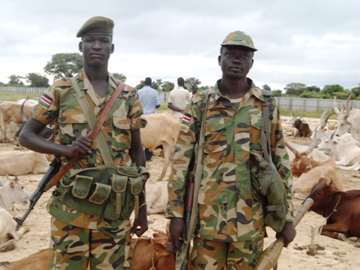Pibor Commissioner accuses South Sudan rebels of rape and murder
October 9, 2012 (BOR) – The Commissioner of Jonglei Sates Pibor County, Joshua Konyi Irer, has accused rebels operating in the are of committing “crimes against humanity” by murdering and raping civilians.

Commissioner Konyi, a former SPLA Brigadier General, said Yauyau’s forces have killed, civilians in the villages of Gumuruk Payam [district] of his county, looted cattle, sheep and goats, culminating in the displacement of hundreds of people of people in the villages to or near to Logolthin Payam, which falls under the administration of Pibor town.
Villages such as Koth Char, Manybol, Lekuangole are under rebel control according to sources in Pibor town.
“South Sudan’s army” the Pibor Commissioner said, “is committed not only to clear the rebels out of the areas but also to teach them a lesson they never forget”.
According to the Commissioner, the SPLA will continue to protect the civilians and properties from the “enemies of peace” who he described as “Khartoum paid agents of destruction” in South Sudan.
Last month the UN Mission in South Sudan and the SPLA reported that an unidentified helicopter had landed in Pibor County. South Sudan said this was proof that neighbouring Sudan was arming Yauyau’s group in an attempt to destablise the nation that seceded in July last year.
Yauyau, a member of the Murle tribe, defected from the SPLA in April 2012 having briefly reconciled with the SPLM in 2011 after his initial rebellion, which he launched in the wake of failing win a seat representing Pibor at the Jonglei parliament during the April 2010 elections.
Although the military has claimed a disarmament campaign in Jonglei State a success insecurity in Pibor re-erupted at the end of August when Yauya’s forces clashed with SPLA killing tens of soldiers.
The fighting in Pibor has forced international non-governmental organisations to vacate the area.Pibor town where majority of civilians are seeking shelter has not yet been directly affected.
The head of the SPLA’s Jonglei disarmament campaign, General Kuol Diem Kuol, told Sudan Tribune from from the South Sudanese capital Juba, that he was did not known anything about the current situation in Pibor.
“I am out of the area now, asked the governor for any security update”, said Lt. General Kuol Diem Kuol. Sudan Tribune‘s attempts to get comments from the state governor were unsuccessful to a bad cell phone connection on Tuesday evening.
Despite the 2005 peace deal that led to South Sudan’s independence last year Jonglei State has continued to suffer from insecurity due to rebellions and cattle raiding.
Violence between rival cattle herding groups spiked in December 2011 when around 6,000-8,000 armed youth primarily from the Luo Nuer ethnic group were mobilized militarily to launched a series of systematic attacks on the Murle tribe of Pibor County over a 12 day period crossing into January 2012.
Over 1,000 people were killed in violence between the groups in 2011 and nearly 900 more in the New Year attacks, which began on 27 December and ended – after a series of reprisal attacks from Murle armed groups – around 4 February.
Abductions of women and children, the destruction of homes and the displacement of thousands of civilians are common dynamics of the conflict a report, compiled by the UN Mission in South Sudan (UNMISS) with support from the Office of the High Commissioner for Human Rights (OHCHR) found in June 2012.
Over 140,000 people as they were forced to flee their homes and/or need humanitarian assistance. The unrest led to South Sudan President Salva Kiir ordering a state-wide disarmament process deploying around 15,000 soldiers and police to the area. However, some groups including Yauyau’s forces have avoided the process.
After two months of the disarmament process the six tribes of the state signed an agreement in the Jonglei capital Bor in an attempt to end the cycle of ethnic violence in the area.
(ST)
